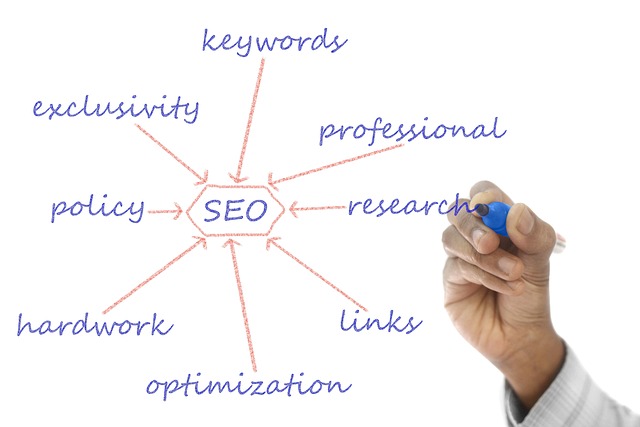Schema Markup SEO is a powerful strategy for structuring web data using Microdata (Microformat) or JSON-LD (JavaScript Object Notation for Linked Data), enhancing search engine understanding and user experience. By applying structured vocabulary from Schema.org, developers create semantic tags that represent entities like people, organizations, products, and locations, leading to rich results like featured snippets and knowledge graphs on search engines like Google. Best practices involve clarity, consistency, and using tools like the Structured Data Testing Tool. Both Microdata and JSON-LD formats improve online visibility, with JSON-LD favored for simplicity and major search engine support. Measuring success involves tracking rich result adoption and organic traffic growth, while future trends predict more specialized Schema Markup for enhanced content comprehension and Rich Snippets Optimization.
In-depth implementation of Schema Markup using Schema.org is a powerful strategy to enhance search engine understanding, driving improved SEO performance. This article delves into the fundamental concepts of Schema Markup, exploring how standardized vocabularies from Schema.org unlock rich result capabilities for search engines. We’ll guide you through best practices and tools for implementation, demonstrate its impact on search visibility, and discuss future trends shaping Schema Markup‘s role in SEO.
- Understanding Schema Markup: A Foundation for Structured Data
- Schema.org: Unlocking the Power of Standardized Vocabularies
- Implementing Schema Markup: Best Practices and Tools
- Enhancing Search Engine Visibility with Rich Results
- Measuring Success: Analyzing Schema Markup's Impact on SEO
- Future Trends: Evolving Schema.org and its Implications for SEO
Understanding Schema Markup: A Foundation for Structured Data

Schema Markup serves as a cornerstone in structuring data on websites, enabling search engines to comprehend and interpret content more effectively. It’s a powerful tool that allows developers to enrich web pages with detailed information about their content using semantic SEO tags. By applying Schema Markup for entities, websites can provide structured data that highlights key details, making it easier for search engines to understand the context and intent behind each page.
This process goes beyond simple HTML markup; it involves the strategic use of Microdata or JSON-LD (JavaScript Object Notation for Linked Data) to represent various types of information. These semantic SEO tags provide structured data that describes entities like people, organizations, products, and places, enhancing the overall richness of search results. Ultimately, effective Schema Markup SEO can lead to more appealing rich results displayed in search engines, improving user experience and driving better online visibility.
Schema.org: Unlocking the Power of Standardized Vocabularies

Schema.org serves as a powerful ally for web developers and content creators looking to optimize their sites for search engines using Schema Markup SEO. By offering a standardized vocabulary, it unifies the way data is structured across diverse websites, making it easier for search engine crawlers to interpret and understand content. This, in turn, leads to enhanced visibility and richer search results, as Google and other major search engines actively support and utilize Schema Markup.
The implementation of Schema.org goes beyond simply adding microdata or JSON-LD snippets to HTML code; it involves crafting semantic SEO tags that accurately represent the entities and relationships within a page’s content. This structured data provides valuable context, enabling search engines to display featured snippets, knowledge graphs, and other enhanced results that not only attract users’ attention but also boost click-through rates. By embracing Schema Markup for Entities, webmasters can ensure their content is not just seen but truly understood by the search engines navigating their sites.
Implementing Schema Markup: Best Practices and Tools

Implementing Schema Markup involves structuring your web content using a standardized vocabulary to help search engines better understand and interpret your data. Best practices include ensuring clarity, consistency, and relevance in your markup, as well as adhering to the latest Schema.org guidelines. Start by identifying the entities present on your pages—like products, events, or reviews—and then use the appropriate Schema types and properties to describe them.
When it comes to tools, several options are available to streamline the process. JSON-LD (a format of Schema Markup) has gained popularity due to its ease of implementation and readability. Tools like Google’s Structured Data Testing Tool can validate your markup, ensuring accuracy. For complex structures, consider using specialized schema generators or code snippets tailored for specific content types, enhancing both efficiency and JSON-LD SEO performance. Remember that Microdata vs JSON-LD is largely a matter of preference and use case, with JSON-LD often favored for its simplicity and support in major search engines.
Enhancing Search Engine Visibility with Rich Results

In today’s digital landscape, enhancing search engine visibility is paramount for any business or content creator looking to attract and engage users. One powerful tool that can significantly boost online presence is Schema Markup SEO. By utilizing Schema.org, a collaborative project aimed at creating structured data standards, websites can provide search engines with valuable insights into their content. This structured data enables search engines to better understand the context and meaning behind the text on a page, resulting in improved visibility and richer results for users.
Schema Markup for Entities plays a crucial role in this process, allowing developers to tag specific entities like people, organizations, products, or locations within content. These semantic SEO tags act as a bridge between the website’s data and search engines’ algorithms, facilitating the display of enhanced features like rich snippets on search results pages (SERPs). Rich Snippets Optimization is a direct outcome of effective Schema Markup implementation, where search engines extract key information from structured data to present users with more informative and interactive query responses.
Measuring Success: Analyzing Schema Markup's Impact on SEO

Measuring the success of implementing Schema Markup on your website is crucial to understanding its impact on SEO. By analyzing structured data’s effectiveness, developers and marketers can gauge how well search engines comprehend and display content. One key metric is rich result adoption; tracking which types of enhanced search results, like knowledge graphs or featured snippets, are triggered by your Schema markup. Tools like Google Search Console provide insights into these interactions.
Additionally, monitoring organic traffic growth, click-through rates (CTRs), and user engagement metrics can reveal the direct impact of Schema Markup for Entities and JSON-LD SEO on search engine rankings. While Microdata vs JSON-LD debates exist, practical testing often shows that both formats, when implemented correctly, significantly improve search visibility. Analyzing these data points allows for a data-driven approach to refining your structured data strategy over time.
Future Trends: Evolving Schema.org and its Implications for SEO

As technology advances, so does the way we interact with information. Consequently, Schema.org, a collaborative project that develops vocabulary for structured data across domains, is continuously evolving. Future trends suggest more focused and detailed Schema Markup for specific entities, enhancing search engine understanding of nuanced content. This evolution will likely result in richer, more relevant Rich Snippets Optimization, providing users with enhanced search results that cater to their individual needs and preferences.
JSON-LD SEO will play a pivotal role in this transformation, as it offers a standardized way to implement Schema Markup for various entities. Search engines are increasingly relying on structured data to deliver accurate and engaging content, making JSON-LD optimization crucial for staying ahead in the competitive digital landscape. By embracing these future trends, businesses can ensure their online presence remains prominent and user-friendly, aligning with the ever-changing expectations of modern internet users.
